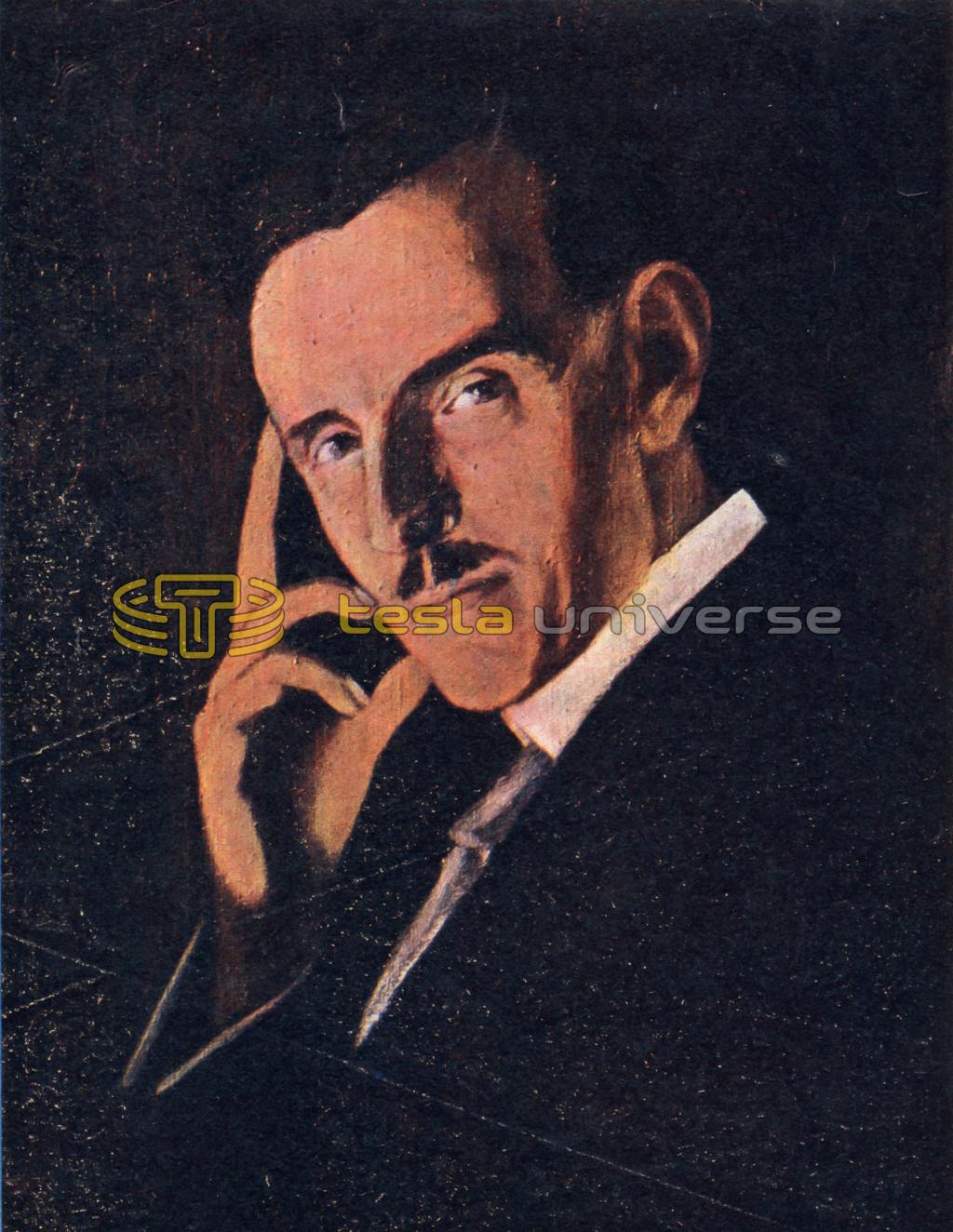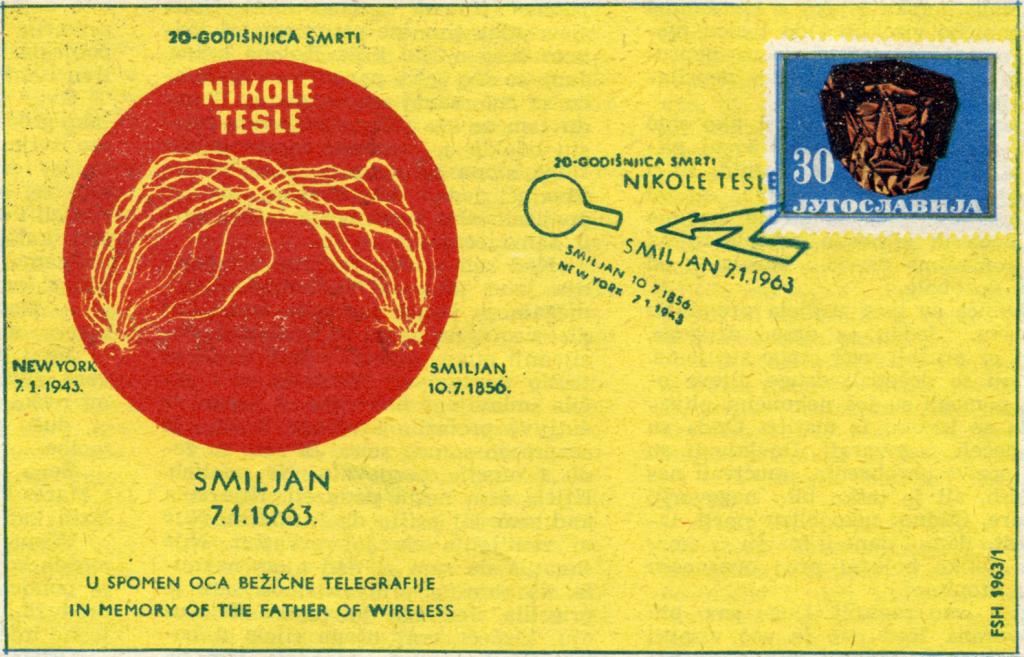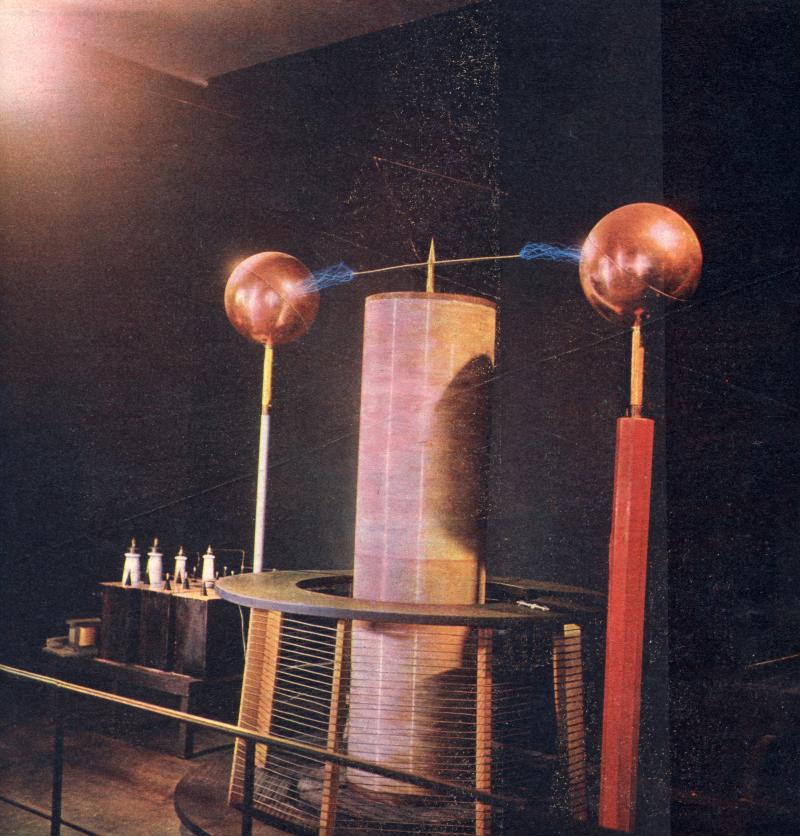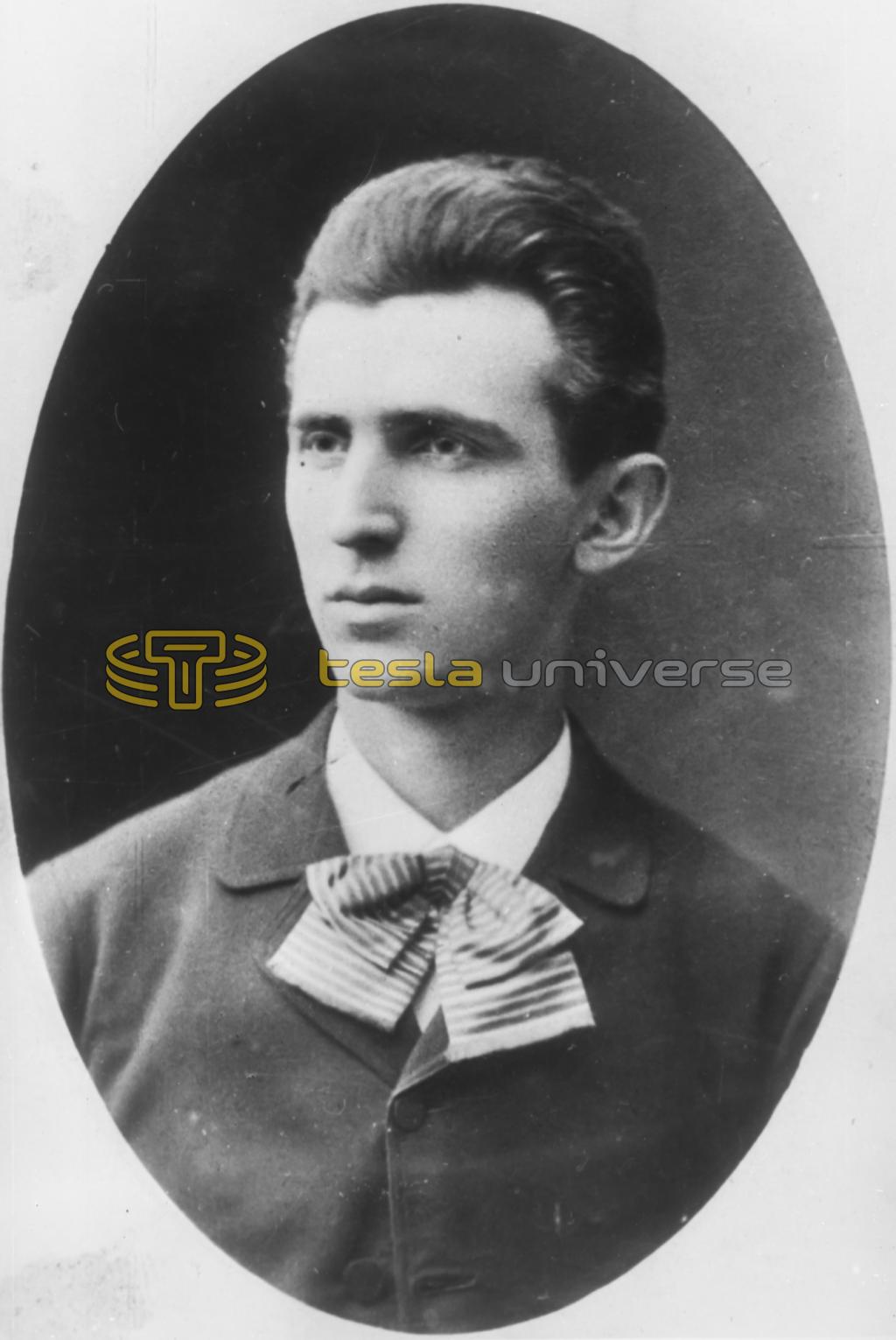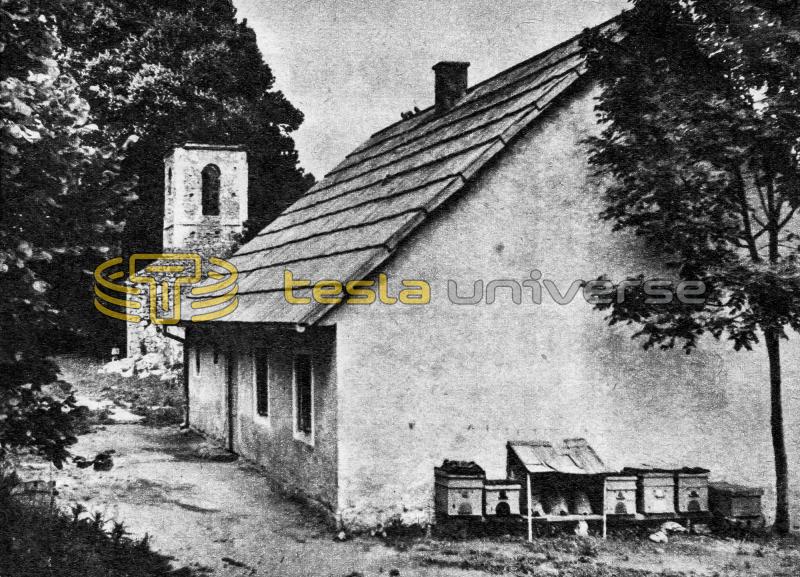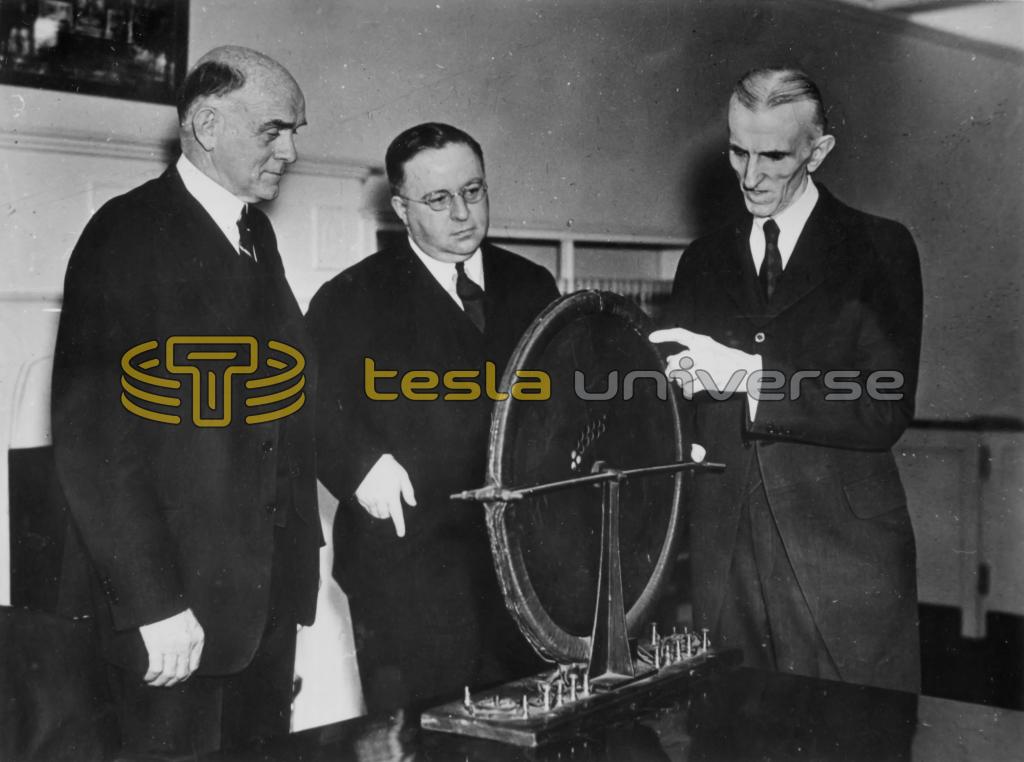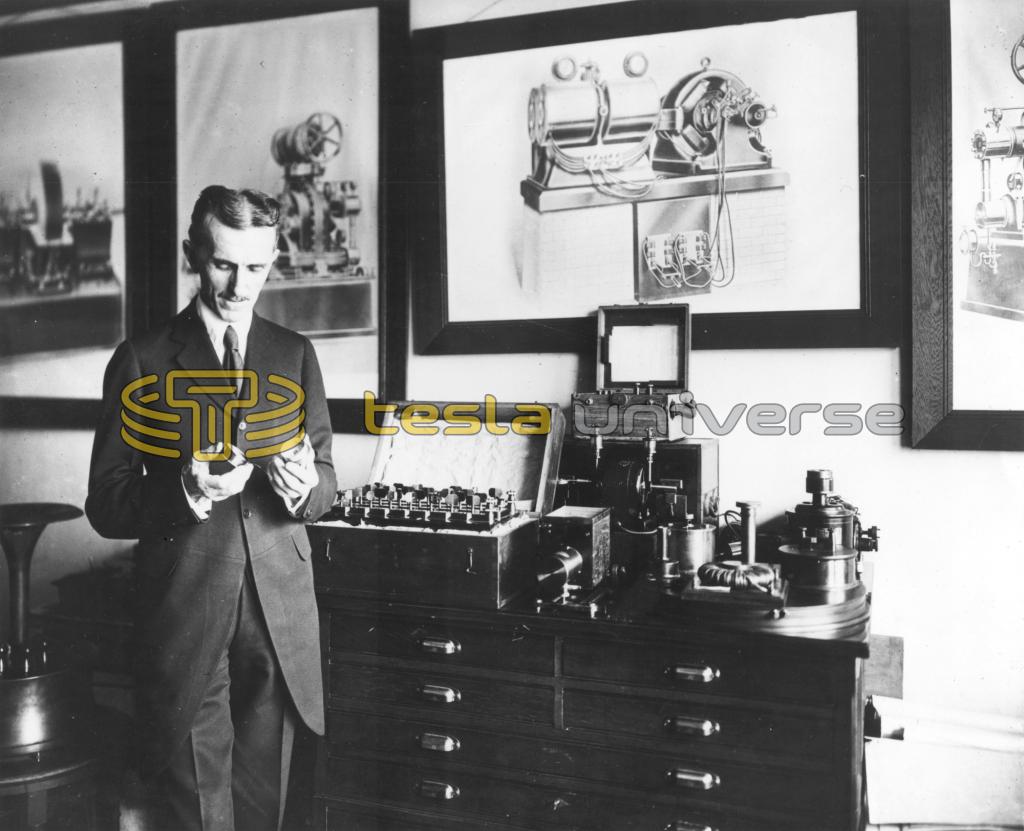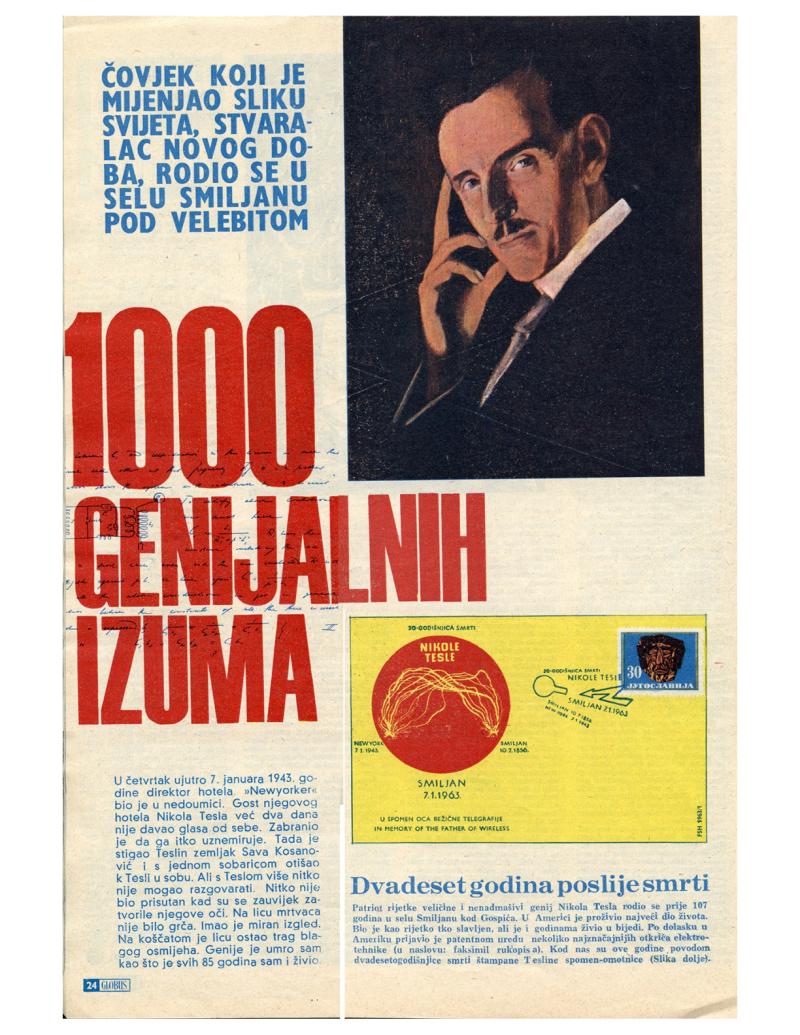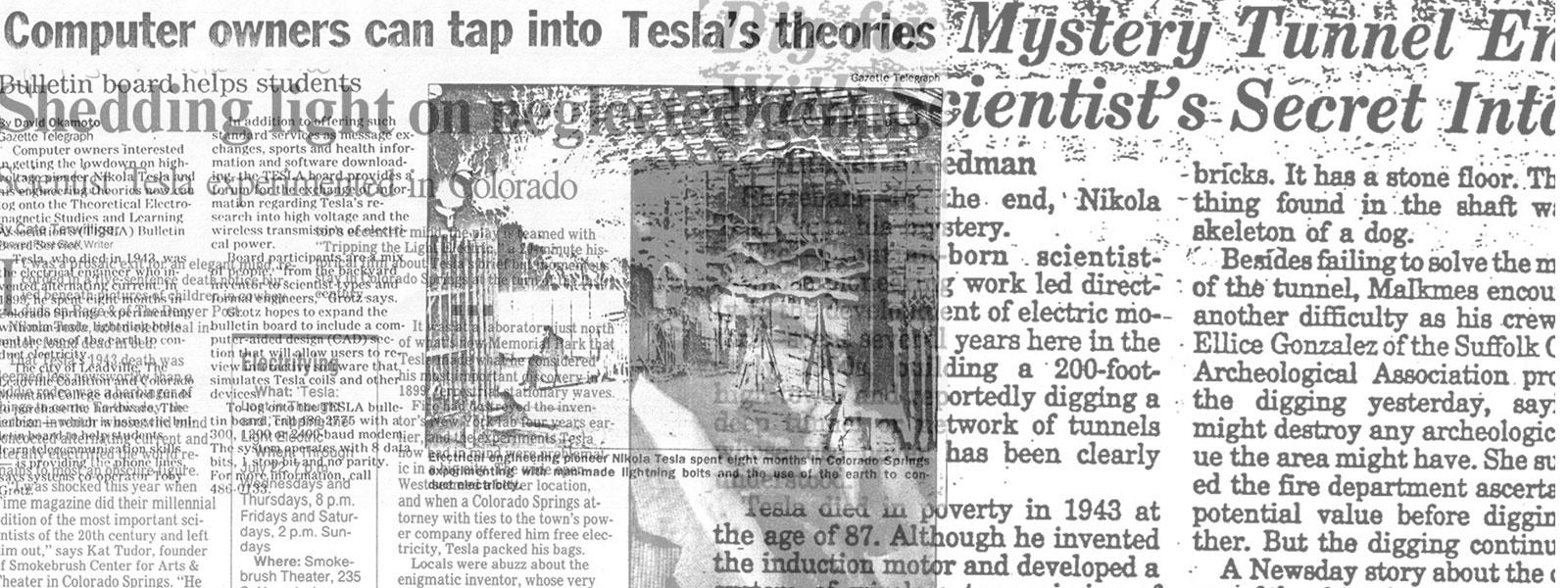
Nikola Tesla Articles
Nikola Tesla - 1000 Ingenious Inventions
Man who changed the image of the world, creator of the new age, was born in the village of Smiljan, below Velebit.
On Thursday morning, January 7, 1943, the manager of the New Yorker Hotel was in doubt. Nikola Tesla, a resident of the hotel, had not been seen nor heard for two days already. Earlier, Tesla had given orders not to be disturbed in his room. Then came Sava Kosanović, Tesla’s countryman and entered the room with a maid. But nobody could talk to Tesla anymore. There was no one there when Tesla’s eyes had closed for the last time. There was no spasm on the dead man’s face. It was peaceful, with a suggestion of a faint smile on his bony face. The genius died alone just as he had lived all his 87 years.
Twenty Years after Death
A patriot of rare greatness and unsurpassed genius, Nikola Tesla was born 107 years ago in the village of Smiljan, near Gospić. Most of his life he lived in America. He was celebrated but lived in poverty for years. After coming to America he submitted some of the most important patents in the field of electrotechnics (facsimile of Tesla’s handwriting in the title). Memorial envelopes were printed in our country to mark the twentieth anniversary of his death. (Image below)
After he had gotten over malaria and cholera, a young man in an old carriage departed to change the image of the world. Genius, whose work is still unmeasured and unfulfilled, had been dying nine months before departure. Had his father not granted his wish to evince inspiration, it seems that the seventeen-year-old would have died. He did not talk, because the two meters long body had become a skeleton, because the voice had dried up, because the strength had gone, so he whispered barely audible. By the movement of his lips his father guessed the meaning:
“I would recover if you would let me study electrotechnics!” Father of the seriously ill young man, whose firstborn son had already died, desperate and scared by his near-death, leaned over his bed:
“Don’t leave us, please! You’ll be an engineer. You’ll go to the best technical school...”
Former orthodox minister in the village of Smiljan below Velebit (TN - a mountain in Croatia), and later protopresbyter in Gospić, Milutin Tesla, would-be army officer, could not even hope that his gravely ill son would outlive him for 64 years.
Nikola had no strength to reply to his father’s promise, but a hint of thrill could be seen on his withered face. There was some incomprehensible strength, something miraculous that kept him alive. Not a single physician nor the greatest optimists did give a chance of recovery to the young Nikola Tesla. He had been dying for nine months, but he surprised them all - the hope that he will study technics revived his half-dead body.
This would have been unbelievable if it had been any other man, but it was possible in the case of Tesla. He was over-dimensioned in everything. A giant somewhat, a wonder of nature! How else could he work 21 hours each day, how else could he work for full 82 hours without a break!
Tesla was not an inventor of practical appliances. Around a thousand of his inventions were noted, but he was more than an inventor and discoverer - he was creator of the new principles, one of the creators of the new civilization. Try to exclude his work from our lives and the factories would stop, the traffic would stop, the city lights would be out. If you exclude Tesla - the future would be worried. He is the mark of our time.
Tesla’s Transformer
Nikola Tesla’s transformer is important as the beginning of the epoch of the scientific and technical creativity in the field of high-frequency current. Along with that, he became famous for around twenty more fundamental discoveries and inventions in the field of production, usage and transmission of the electrical energy. His first discovery was the rotating magnetic field.
A common man would say: Nikola Tesla’s life was an extraordinary struggle, but Tesla thought otherwise. If we judge him as a man - and it is hard to measure him as one of us! - then we have to eliminate him from the order of our comprehension. Tesla did not invent only rotating magnetic field, polyphase system, high-frequency currents, high-voltage currents, antenna and fundaments of radio technic; he was not just some lucid, grandiose inventor of electro-chemistry, interplanetary communications, teleprinters, gear wheels, turbo-machines, air-conditioning devices, airplane drives, helicopters, cold lighting, cameras, natural colors photos, a theory of relativity, energy sources and many other fields that interested him, but he invented himself - Tesla as a principle.
He was a self sprouted giant.
He was inventing since his fourth year until his eighty-seventh year of life. From the brook in Smiljan, where he amazed his peers with his miraculous “mill-wheel”, to untamed Niagara; from Gospić, where he, with an uncomprehensible intuitive cognition, as a seven-year-old saved the reputation of firemen by repairing a newly-bought water pump, to the visions of interplanetary communications. One of his biographers was right when he said: Tesla’s accomplishments seem like a dream of some drunken god!
When in early September 1875 he left Gospić, he was 19 years old. Tall, with long arms, weighing around 70 kilograms, he was still bearing marks of two serious diseases. His illiteral mother from the well-known Mandić family of Lika (TN - a region in Croatia), prudent and refined woman who knew by heart many folk songs and all verses of “The Mountain Wreath” (TN - a poem and a play written by Prince-Bishop and poet Petar II Petrović-Njegoš), stood by her son with tears in her eyes, while the coachmen were harnessing horses. She knew her curious son’s fervor. A hundred times she had gotten mad at the boy while he had been awake over his fat books. But on that day only Tesla knew - he had always been self-confident - how significant his trip north to Gratz would be.
Skinny Likan, gentle to his mother like a most sensible boy, carried with him enthusiasm immeasurable to some ordinary man. Clothes were carefully folded in the chests and he looked very elegant. He was always like that - attentive to details towards his belongings.
He leaned towards his mother and kissed her gently. His father, solemn, hiding his feelings like a true Likan, stood by his spouse and son. When a coachman, with a crack of his whip, signaled the start of the journey, protopresbyter Milutin firmly clenched long, skinny fingers of his boy. Young Tesla, a dreamer, who by then had already known several foreign languages, and had read a large number of books, a young man who by heart knew almost all Göthe’s verses, did not express fear of the unknown nor sadness of parting.
He sensed some, still incomprehensible, peculiarity of his life.
He departed to confuse and change the world. On rainy September, 88 years ago, the carriage took him to Karlovac, where he had already spent three years in the higher classes of Gymnasium. From there he continued by train. Tesla left his home forever. He would never have it anymore. Foreign cities, foreign people, foreign countries - that is Tesla’s biography. Little hotels, luxury boarding houses, or grand hotels - those were his residences. But, like no one before, he knew how to conquer all and then give up everything. He became an unsurpassed conquerer, greater than any warlord, and, at the same time: the greatest benefactor.
Even a few years after leaving Gospić, after parting with his father Milutin and his mother Đuka, Tesla had his own biography. But before the end of his studies, his biography had been identified with the modern world history, with civilization history. The beginnings of that identification were early, probably in Smiljan, on a small creek where little Nikola mounted his first invention. And true identification came one evening in Budapest in February 1882. Nikola was walking with a friend of his. It was the evening when the revolution began. The winter was mild. The Sun was sinking down in the distance and Nikola was reciting “Faust”:
The glow retreats, done is the day of toil;
It yonder hastes, new fields of life exploring...
Twenty-six-year-old skinny and tall young man was reciting and his eyes were sparkling. He waved his arms in the air and walked in the rhythm of the verses. Suddenly he shouted:
“Watch me reverse it!”
Only he could know that it was not about the Sun. Only he could see in a miraculous vision the image of an ingenious invention. Suddenly, he realized the truth. In a moment he discovered a machine based on a completely novel system, the beginning of the revolution named civilization or - Nikola Tesla.
On that February 1882 evening, Tesla discovered a long-sought-after truth - he discovered the principle of the alternating current motor.
Still, six full years had to pass before he filed this discovery and six more basic patents. In the meantime, he was a respectable technician and unremarkable worker. In the meantime, he traveled to Paris and across the Ocean. In those six years he discovered alone to himself ingenious wonders of electrotechnics and wrote hundreds of songs. When he, without baggage but with an unpublished book of songs in one and two cents in the other pocket, arrived in New York Harbor, he was burdened with knowledge about the future of the world. He had a kind of confirmation for that. It was a recommendation for the famous Edison which had been written by a representative of Edison’s company in Paris:
“I know two great men: you are one of them and the other is this young man, who I recommend to you.”
In those six years he demonstrated to Edison his deftness, craftsmanship, knowledge and diligence, bit also vanity and stubbornness. They socialized and they quarreled; the cause of that was not their personalities, but scientific discoveries. Edison strongly opposed alternating current.
The first few of his patents Tesla submitted between November 12 and December 20, 1887. At that time he was a co-owner of “Tesla Electric Company”. One of his patents - Electrical Transmission of Power - filed as number 382280, begins with these words:
“To all whom it may concern, be it known that I, Nikola Tesla, from Smiljan, Lika, now residing in the city and State of New York, have invented certain new and useful improvements in the Transmission of Power...”
There you go: Tesla from Smiljan! He wrote it at the time when he, with an immense intensity of an ingenious discoverer and creator, was creating this today’s world of ours.
Tesla’s inventions, new systems, creations of incomprehensible greatness, could not have been eagerly accepted. To observe the practical meaning of his induction motor and polyphase system - meant to observe the future.
The first to realize that was a strong, fat and grey-haired inventor and industrialist George Westinghouse.
“Mr. Tesla,” said the old man, “here you are!” and he handed to the tall skinny man a million dollar and a contract by which in the next 15 years Tesla was to receive a dollar for each horsepower.
That was in the same week when his patents were granted in May 1888. Not a full year later, when Westinghouse’s company faced financial hardship, Tesla tore up both copies of the contract before wise industrialist:
“You believed in me when others didn’t,” he calmly said. “You came to me as a friend... The benefits for the civilization of my polyphase system are more important to me than money. You will save your company so you can continue to develop my discoveries.” Tearing up the contract he smiled:
“There won’t be any troubles. Is this enough?”
If anybody needed a large investment it was Tesla. But, when he had no money, nor his laboratories - and he was without them most of his life - he was creating in his head. In his early childhood he discovered his miraculous ability of visualization. He could visualize each of his inventions to the tiniest detail. While still in gymnasium he could solve the most complicated algebra task in his head: in his mind the operations were performed with lightning speed and he had an impression he was reading them from the board. Often times young Tesla would know the solution almost at the same time as the teacher would set the equation.
It seems that that feature helped him a lot to become the most authentic explorer of nature and human, and to - as the Americans would say - “become an important chapter in the history of America.”
They say for Tesla that he had been one of the most useful men that had ever lived. No one has done so many good deeds for humanity.
Tesla created so fast and so much that he had to stay uncomprehended. All his basic inventions gave enormous possibilities to be used by practical spirits. But, by using Tesla’s inventions, others were often stealing the glory. No, the tall Likan did not care - didn’t he used to say: “Why would I need glory!” - still, he cared for the truth. Many of his inventions were attributed to others. And all that while he was still alive! Delusions were slowly corrected and over the time the world found out that a loner, a wizard and a visionary Nikola Tesla was:
- the father of the radio
- the father of the radar
- the forefather of the robots
- the father of the wireless transmission of energy
- the father of the wireless telegraphy
the greatest giant, “the most prominent personality in the field of electrical science”.
He was especially astonishing with his discoveries in the area of high-frequency currents. In a dark room, with two vacuum-bulbs, he would drive crazy his assistants: bulbs would shine with an intensive, creepy blue-white light. It was unthinkable. No connection with the electric source and the bulbs were lit up!
But that was only a small compartment of his work. For, if we know that no one had ever achieved accomplishments with such swiftness, that no one like Tesla had found the most marvelous solutions, then it can be conceived how many discoveries he had accomplished since that night in the Budapest park, when in the early sunset he recited Göthe, until he died in January twenty years ago.
It seemed that he could have achieved anything he could think of.
“Whenever an idea about inventing something would come into my mind, I would carry it for months and years. From time to time my imagination would work on it and I would think about it, but not particularly focused. That was the incubation period. It would be followed by the direct endeavor period. I would carefully seek for every possible solution. I would contemplate, focusing my attention on the narrow field of my research. When I would carefully contemplate the problem, which would already obtain its shape, I would start to feel that I was getting close to the answer. It was a strange thing that in the given moment I would sense that I had correctly solved the problem and that I would achieve what I was striving for. At that stadium, the solution would still be in my subconsciousness and it could take a while before it would appear in my mind. Before I would draw it on paper, I would complete all the work in my mind. In my mind I was changing my constructions, perfecting them and I was designing new inventions. Although I would not make any drawings I would give the mechanics all the details and measures, and when the work was done, all the parts were fitting like they had been made after a blueprint.It made no difference to me if the machine had been tested in my mind or in the workshop.
A little more than 70 years ago he became a citizen of the United States of America, but he remained a Yugoslavian patriot until his death. He was expressing that everywhere. In his nature and behavior there was some ancient Slavic goodness, gentleness, some natural, non-artificial kindness. He loved birds, but humans most of all. He left no descendants because he had time for nothing but science. He let only pigeons enter his life for a moment. He was happy when they were landing on his shoulders while he was feeding them.
From Smiljan to America
In 1856, Đuka, wife of Milutin Tesla, the archpriest of Smiljan, gave birth to her fourth child - a son, Nikola. The birth house of Nikola Tesla had been destroyed during the liberation war, but it was rebuild and it is Tesla’s Memorial Center now. Nikola was schooled in Smiljan, Gospić, Karlovac, Gratz and Prague, and when he was twenty-eight years old he left for America. Even before his departure he discovered the principle of the rotating magnetic field.
There are no facts to confirm that he graduated, but during his life, he received a doctorate degree from many universities. He was awarded an honorary master of Philosophy and was a member of several academies.
No Time to Sleep for Him
Tesla was a tireless worker. He would laugh to Edison who would fall asleep in an armchair, and he himself would sometimes sleep on foot. Once, he had been working in his laboratory for 82 hours without a break. When Tesla discovered the polyphase system and made the induction motor, the first to comprehend the practical meaning of that invention was the industrialist Westinghouse. Tesla received a million dollars in cash for that. He spent a year in Westinghouse’s company.
He did not care for public acknowledgments and praises. He was barely persuaded to receive the greatest American scientific award - Edison medal, and he was probably the only man to refuse the Nobel prize.
He was worried about mankind. While changing the image of the world, creating great achievements, he was afraid not to create something against humans. He showed his patriotism during the last war. In April 1942 he wrote a message on three sheets:
“My brothers in America:
...In this year, 1942, the forces of evil gathered round Hitler must be destroyed. Practically every day we obtain proofs of this in the power of the attacks of Soviet Russia and our own admirable fighters in Yugoslavia... The fate of the Serbs, Croats and Slovenes in the Old Country is inseparable... Here it is incomparably easier to do one’s duty than in the bloody battles in the Balkans... United, we fulfill our duty to the martyrdom of our people, to America, to humanity...”
A few months later he wrote that he had been proud to be a Yugoslav, because: “Our people have such strength that there is no power that can destroy it...”
That was spoken by the man who thought about himself the least, who indulged in pleasures the least. That was written by Nikola Tesla, descendent of the warriors from Lika, one of the greatest minds of mankind. That is who he was, and he was saying: “My life has been a continual oscillation between the agony of failure and the rapture of success.”
